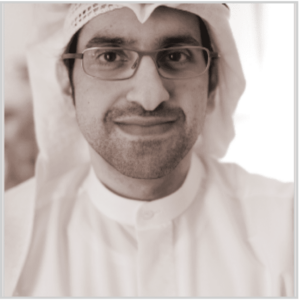AUTHOR: INDIA STOUGHTON
Sharjah-based writer and art collector Sultan Sooud Al-Qassemi reveals a selection of his favourite books and talks about using culture to counter the shortcomings of mass and social media.
 Sultan Sooud Al-Qassemi is many things – columnist, social commentator, financial broker, art collector, founder of Sharjah-based Barjeel Art Foundation and prominent Twitter user, with a following of almost half a million. He is also a member of one of the Emirates’ ruling families, although he often chooses to forego adding the title Sheikh before his name. A modest and an engaging conversationalist, he sits down with Selections to discuss reading, writing, why social media poses a threat to literature and countering media propaganda with art and culture.
Sultan Sooud Al-Qassemi is many things – columnist, social commentator, financial broker, art collector, founder of Sharjah-based Barjeel Art Foundation and prominent Twitter user, with a following of almost half a million. He is also a member of one of the Emirates’ ruling families, although he often chooses to forego adding the title Sheikh before his name. A modest and an engaging conversationalist, he sits down with Selections to discuss reading, writing, why social media poses a threat to literature and countering media propaganda with art and culture.
“Most of what I read is fiction,” he reveals. “I read Arabic and English fiction, whether they are modern classics or contemporary books… My daily reads are business, as well as news online about art. So when I read books, I prefer to read books that are fictional.”
Like many people, Al-Qassemi sees literature as means of escape from the daily grind. “I like fiction because it allows you to go into a parallel reality, to sort of daydream, to live the life of someone else,” he explains. “I especially love fiction that is in the first person. It’s almost like reading someone’s diary. There is, I suppose, an element of voyeurism in it, but if you think of a book like The Catcher in the Rye, it transports you into the mentality of that kid, so there’s an element of escapism in these books, which is why I like them.”
Asked to name titles that have had a particular impact on him, helping to shape the way he sees the world, Al-Qassemi immediately jumps to George Orwell’s dystopian novel Animal Farm, a satirical exploration of revolution and the cult of dictatorship. He also cites Egyptian author Naguib Mahfouz’s Children of the Alley, a controversial novel retelling the stories of the three Abrahamic religions that helped Mahfouz to win the 1988 Nobel Prize in Literature but also resulted in two extremists stabbing the author outside his home. Moroccan author Mohamed Choukri’s acclaimed autobiography For Bread Alone is another favourite. Al-Qassemi also shares his great admiration for poet, novelist and former Saudi ambassador to the U.K. Ghazi Al-Gosaibi, the only author by whom he has read every book – an impressive undertaking extending to almost 40 titles.
It’s a diverse selection, but what appears to link these authors is their focus on the very subjects that Al-Qassemi himself tends to write about – politics and social equality.
“I write a little bit of fiction,” he admits, “but most of what I write is contemporary social commentary, so it’s commentary about the Arab world, it’s commentary about art and culture, about politics, social issues. I also keep a diary every day, so I’ve written every day for the past 23 years. It’s interesting because I can chart who I was and how I’ve changed.”
Al-Qassemi’s Twitter feed is a fascinating place, linking to articles on everything from art and culture, to tourism in the Arab world, to the war in Syria and financial matters in the Emirates, as well as sharing information about scholarships, suggesting books to read and promoting inspiring figures to follow.
As for the impact that social media has had on young people, particularly when it comes to literature, Al-Qassemi says it can be used for good or bad.
“With regards to the positive impact, a lot of people are reading more, a lot of kids are reading,” he says, adding “but unfortunately they’re reading the wrong characters, the wrong texts. For me, social media should be a conduit to something more meaningful. It should be a means to an end, rather than an end in itself… One of my favourite accounts on Twitter is @VeryShortStory. It’s amazing! It’s a story in 140 characters. Facebook and Medium give you more space to write, but usually people there read 800 words, tops. You really need to make sure that kids spend a significant amount of time with books, and I think social media has become more of a distraction than a conduit to something better.”
Al-Qassemi is passionate about sharing knowledge, promoting Arab artists and encouraging young people to engage with art and culture. Barjeel Art Foundation has a mandate to contribute to intellectual growth in the region and publishes two to three art publications every year, releasing three in October alone.
“I think we need to take the art to the people,” says Al-Qassemi. “Our battle today is a battle for the minds of the youth in the Arab world. There’s so much propaganda going out from Middle Eastern TV stations and international TV stations that is so negative and that is either based on conservative values or rigid values, or solely ideological purposes and themes – we need to enlighten the youth. That’s why we have to be proactive, and win their minds by sharing art and film and music and culture and dance and performance art and photography. This is really a battle for the future of the Arab world, and everybody has a role to play.”
This article was originally published in Selections Arts on April 13, 2017.